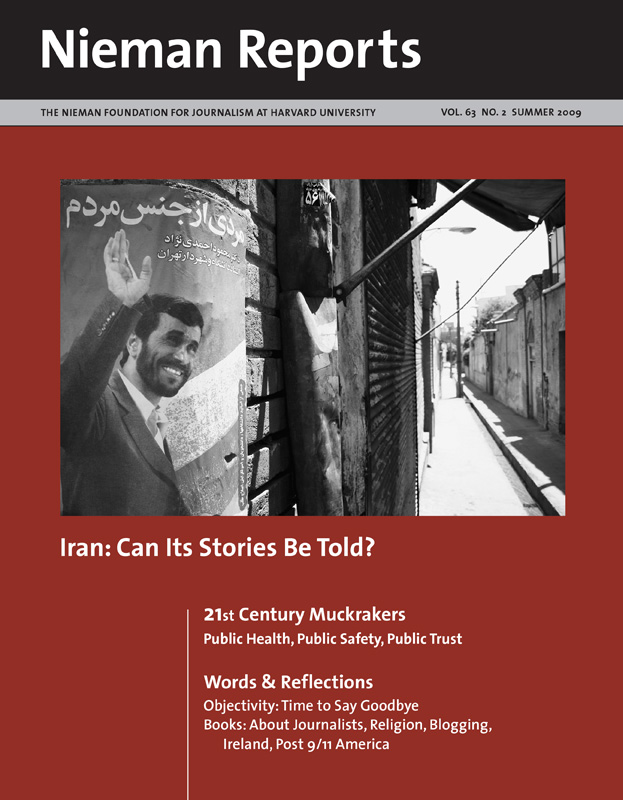Masoud Behnoud, a prominent newspaper editor in Tehran during the 1970’s and 1980’s, was imprisoned as part of the Islamic Republic’s crackdown on nongovernmental and independent newspapers. Here he remembers some difficult moments involving young women reporters and the role he played as their journalism teacher in Iran from 1988 to 2002. He now lives in London, where he works for BBC Persian and has a daily BBC TV program in Farsi about Iranian newspapers.
With her small frame she would sit in the first row of class, squint her eyes, and listen. She never raised her voice, even at the end of the class when she would come to my office to ask something. One time, however, she did not learn a particular lesson, meaning she could not accept it, could not believe it. When I was saying that a reporter has to be objective, Fereshteh stood up and asked whether she still had to be objective in an interview with Saeed Criminal. I said, “Yes.” With a pitch louder than usual she asked, “How can I be objective?”
Saeed Criminal was Saeed Hanai, the same guy who had strangled 16 women in northern Iran. He became a darling of fundamentalists because he claimed to have killed the women in order to purify the earth. Saeed Criminal was a monster. And Fereshteh means angel in Persian.
I was sure she did not accept the notion that a reporter has to be detached and objective. She did not accept it even when I reasoned that only with detachment would her work be effective; only when it was not in opposition to someone or to a situation right from the beginning; only when she can lay out or question the situation effectively. Only then will the reader take a side in the end. “It will turn out the way you want it to,” I said.
Even to influence, one has to be objective. A report cannot take a side and have a direction …
Even when I said these things.
In the next class, Roya was the same, as she stood up and renounced the idea. She asked, “Are you objective?,” and she firmly questioned how anyone can be objective.
In those years, Banafsheh was a young girl in that class. When I asked the class to write a report of their choosing, she described a man who had nice facial features, wrote well, and spoke romantically, but whose heart was not tender, maybe made out of iron. Banafsheh was describing me. She had not accepted that one could be objective, either, and she had voiced her dissent in that way.
Objectivity in a society in which violence against women has become institutionalized is a difficult task, and in vain I wanted young women to discover this—the very ones who can better feel pain. Why was I adamant to dictate callously and test them on classic journalism?
The day they arrested Fereshteh, I could not believe they would take that delicate girl to prison. But they did, and the newspaper picture showed her walking toward prison with a smile, staring straight at the camera—into my eyes. It was as if she was saying, “See professor, it’s not possible to be objective.”
The day they were trying Banafsheh, I went and sat in the back of the courtroom. I hid myself pointlessly so she would not be embarrassed. I was mistaken; she was not ashamed to be standing on the defendant’s stand. She stood tall and proud and said, “I wrote it. I gave my signature for women’s freedom, in order to prevent oppression in a misogynist society and legal persecution of women.”
She did not even ask for mercy. The judge, prosecutor, guard and court were all men; even Banafsheh’s lawyer was a man. Except for a few members of her family and a couple in the audience, there were no women in the room. Still, it seemed to me, even the lifeless statue of justice with its empty scale was crying—the consequence of the words of a romantic young girl.
Our daughters, our students, young women reporters, in a traditional society like Iran, take photographs, conduct interviews, and write reports. Some like Asieh exhaust their own health in their effort to help young girls facing execution; some like Massih become wanderers. All because they say something their patriarchal society deems bigger than their mouth. They say you talk too much. A woman should be modest and chaste, raise kids, cook and clean the house for her man returning from work, tired and expectant.
Young women are doing in one generation something that in other societies it has taken many generations to accomplish. So what if they cannot be objective about Saeed Criminal who murdered all of those women and the serial killers who murdered 10 intellectuals and dissidents.
Today’s generation of Iranian women reporters are doing big things. Their mark will be left on history. Let the professor not accept their papers. Let the heartless professor tell them that in writing a report they have to be objective. Objectivity only had meaning when Fereshteh smiled at her guard while being taken to prison, teaching him that he was not her enemy and, if she had any enmity, it was with the tradition of misogyny.
She had learned this lesson from life.



